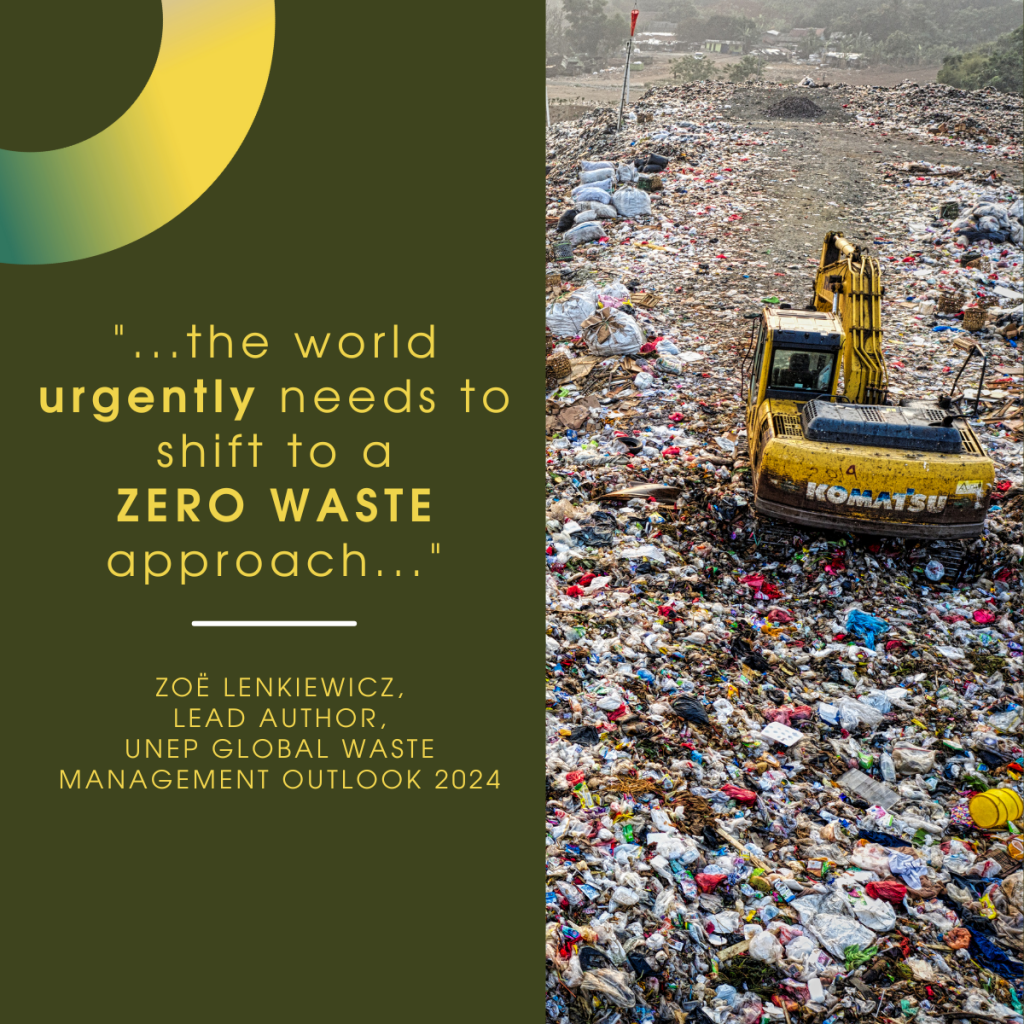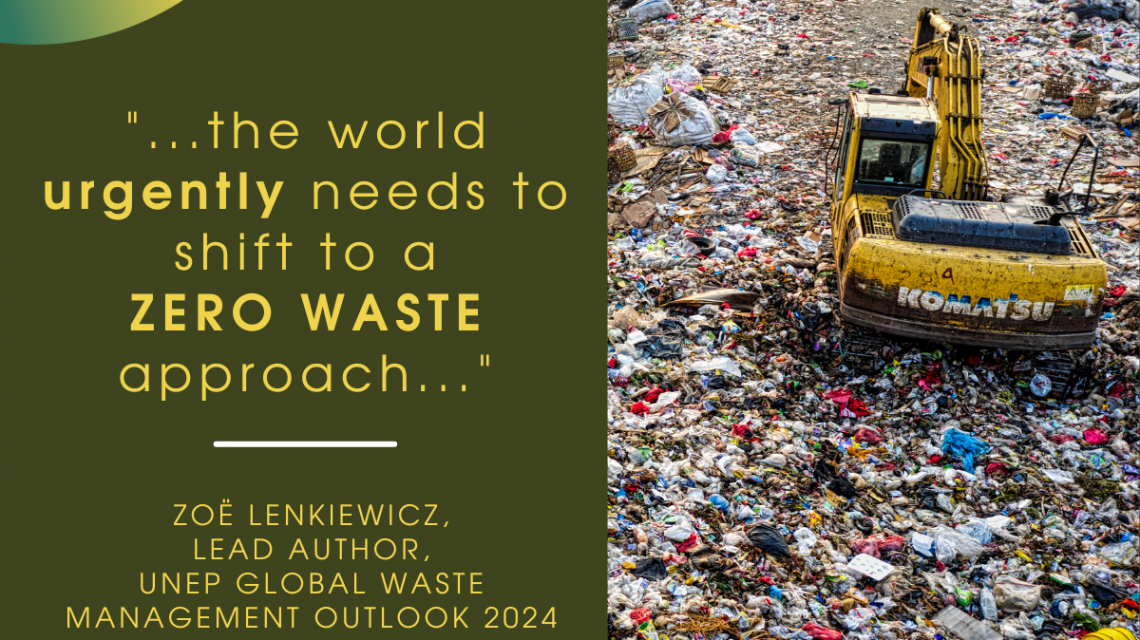
To achieve a zero-waste society, governments, industry and citizens need to work together to implement a rapid transformation in the way products and services are delivered. Industries also need to work on reducing waste within the value chain for their products. Such initiatives can achieve significant financial savings for both businesses and consumers while drastically reducing the quantity of waste arising in the municipal waste stream and its negative environmental impacts. — Global Waste Management Outlook 2024.
The new UN waste report, Global Waste Management Outlook 2024, jointly published by the United Nations Environment Program and the International Solid Waste Association, provides insight into the state of global waste generation and the cost of waste management. Since waste is tied to every company’s bottom line, businesses must understand the significance of this report and how to respond. Here’s what businesses should know:
UN Waste Report: Key Findings
The global waste problem is continuing to grow at an alarming rate. Municipal solid waste generation is predicted to grow from 2.3 billion metric tons in 2023 to 3.8 billion metric tons by 2050, with multiplying accompanying negative impacts on climate, the environment, health and more.
Here’s what the report says about how worldwide expenditure on waste could change based on three scenarios:
- If nothing is done, costs will double. Without urgent action on waste management, by 2050, annual cost of global waste management could almost double to USD 640.3 billion.
- If some solutions are implemented to get waste under control by taking waste prevention and management measures, the world could LIMIT net annual costs by 2050 to USD 270.2 billion.
- Adopting a Zero Waste and circular economy model on the other hand could lead to a full net GAIN of USD 108.5 billion per year.
What Does This Mean for Businesses?
1) Pressure to Act to “decouple waste generation from economic growth”
Businesses are the largest generators of waste. With waste recognized as an alarming global problem, pressure on countries and cities to reduce waste will reach every business that operates around the world. Anticipate more regulations coming down the pipeline and growing public demand to reduce waste.
Businesses that want to remain competitive globally will need to heed the UN’s call to action and respond appropriately with Zero Waste strategies.
This is especially true for business in many large and fast-growing economies, which are struggling with rising waste and costs. The report calls for efforts to “decouple waste generation from economic growth” with circular economy approaches.
2) Actions Can be Simple
The report notes that many actionable steps are straight forward, such as this one simple example:
Government bodies and businesses can show leadership by installing water dispensers in meeting rooms, eliminating the need for single-use plastic water bottles.
3) Focus on Pathways
The report explores the pathways to prioritize and prevent waste, and notes that they include 3 requirements:
- Accurate and transparent waste data is needed at all levels to enable informed decision-making to prioritize action on waste.
- Zero Waste strategies are what enables a circular economy. These strategies should include a focus on food waste.
- The adoption of behavioral science to engage people, change habits, and produce lasting change, for example, by making it easy to reduce waste.
UN Waste Report Recommendations
The report understands that “industry invests following leadership and direction from government,” and that “governments and industry can engage to create the enabling conditions for a circular economy, and ultimately zero-waste societies.”
For businesses, in particular producers and retailers, the report suggests these recommendations:
- Recognize the vital role and responsibility of the private sector in waste prevention;
- take responsibility for waste generation and respond to society’s demands and needs to reduce the resource-use footprint of commercial activities.
- Pursue business models that achieve financial savings through resource efficiency, such as refill, deposit return and design-for-recycling.
- Support governments with efforts to regulate waste generation, recognizing that regulation creates a level playing field and gives certainty;
- favor regulation over voluntary targets which only add to uncertainty;
- avoid greenwashing.
Practical Ways to Start the Shift in 3 Steps
The main takeaway is that going Zero Waste is not just an achievable goal, but a crucial one. As the UN Global Waste Management Outlook report concludes, the world urgently needs to shift to a Zero Waste approach.
Businesses can tailor a plan that meets their needs and timeline. It can even start with just a simple action, like the one suggested in the report about replacing disposable single-use items with reusable ones. The goal is to make a plan to start reducing waste.
How to start? Below are three strategies to get your business on the Zero Waste track. These 3 strategies coincide with the requirements mentioned above that the UN report notes are needed to forge pathways to prioritize and prevent waste.
1) Data
The UN waste report notes the importance of accurate and transparent waste data at all levels to enable informed decision-making to prioritize action on waste.
On a business level, this means understanding how much and what types of waste your business generates and diverts by conducting a waste audit. Data from your waste audit will let you know how your waste program is functioning, and how to make improvements. A waste audit also establishes benchmarks that allow you to track your waste and set Zero Waste goals for all aspects of your business, from purchasing to disposal.
Take a look at what data from over 100 waste audits reveal about what businesses globally are discarding, and find out how your business compares. Are you paying to send more materials to the landfill than necessary?
2) Set Zero Waste Goals, Focus on Food Waste
The UN waste report points out that Zero Waste strategies are what enables a circular economy, and that such strategies should include a focus on food waste.
Organic materials make up the single largest component of U.S. municipal solid waste according to the U.S. EPA, and they make up 36% of what is found in most businesses’ trash on average, according to a Great Forest survey of over 100 waste audits conducted worldwide. Any waste reduction goal should include an organics program.
3) Create a Zero Waste Mindset
The UN waste report suggests the adoption of behavioral science to engage people, change habits, and produce lasting change. It notes: “By making it easy to ‘do the right thing’, most people will eventually adopt the desired behavior change.”
To achieve Zero Waste, businesses must adopt a Zero Waste mindset and create a culture shift in the workplace. This means encouraging everyone in the business to rethink the idea of waste. If something cannot be recycled or reused, perhaps the solution is to look for alternatives.
Learn more:
Zero Waste Business in 3 Steps: A Strategy To Reduce Waste and Costs

